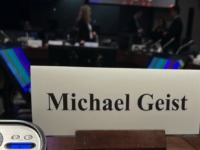I was pleased to appear yesterday before the Senate Standing Committee on Transportation and Communication on Bill C-18. The discussion focused on a wide range of issues, including the risks of mandating payments for links, the non-compliance with international copyright obligations, why the CBC should not be included in the payment for links system, and how a fund would be a better approach. My opening statement, which tried to identify some fixes to the bill, is posted below as text and as a Youtube video.
 Articles by: Michael Geist
Articles by: Michael Geist
The Law Bytes Podcast, Episode 165: Monica Auer on Whether the CBC Is As Independent As It Says It Is
The recent dust-up between Twitter and the CBC over a “government funded media” label sparked fiery rhetoric from both sides. Opponents of the CBC invoked the notion of propaganda from the public broadcaster, while supporters responded that such comments amounted to an attack on a Canadian institution. That heated debate obscures the reality that there is a discussion worth having about the CBC’s independence, its transparency, and public reporting. Monica Auer, the executive director of Canada’s Forum on Research and Policy in Communications, recently wrote about that issue and she joins the Law Bytes podcast to assess whether the CBC is as independent as it says it is.
The Bill C-11 Compromise That Never Came
The long legislative road of Bill C-11 comes to an end later today as nearly 2 1/2 years after the original Bill C-10 was first tabled in the House of Commons by then-Heritage Minister Steven Guilbeault, the Senate will vote to approve the bill. I’ve been asked repeatedly this week about what now lies ahead, but I think it is worth one more look back. I have long believed that politics invariably involves compromise as governments look to maximize the political benefit and limit the political risk from any given policy. The emphasis on compromise is why stakeholders rarely walk away entirely happy on most issues that feature a diversity of views, whether it is copyright, privacy, or Internet regulation. Yet with Bill C-11, compromise from the government never came.
The Law Bytes Podcast, Episode 164: Teresa Scassa on the Latest Canadian Court Ruling on Facebook and What It Might Mean for Privacy Reform
The controversy over Facebook and Cambridge Analytica was back in the spotlight in Canada as the Federal Court sided with Facebook and against the Privacy Commissioner of Canada in a decision arising from a 2019 investigation into the matter. The Privacy Commissioner ruled against Facebook in 2019, but Facebook disagreed with the findings, took the matter to court, and won. What lies behind the decision and what does it mean for privacy in Canada? My colleague Teresa Scassa, who holds the Canada Research Chair In Information Law, is widely regarded as one of Canada’s leading privacy law experts. She posted on the decision soon after its release and joins the Law Bytes podcast to talk about the ruling and its broader implications.
Government Gets the Law Wrong as it Finally Makes the Case Why it is Rejecting the Bill C-11 User Content Regulation Fix
With Bill C-11 in the final stretch – Senate approval could come this week – the government finally provided a more detailed explanation for rejecting the Senate’s user content regulation fix. Indeed, after weeks of false or empty justifications for the rejection, Senator Marc Gold, the government’s representative in the Senate, at long last tried to make the case for rejecting the amendment. Leaving aside the fact that if there were problems with the amendment, it was open to the government – and is still open to the Senate – to fix any perceived problems by amending the amendment, the reality is that Senator Gold’s explanation gets the law wrong. It is sad that as the bill nears passage, the government doesn’t seem to understand or misleads on the impact of its own legislation. I realize that another long post isn’t going to change that, but the thousands of Canadian creators who spoke out on their concerns deserve better.











